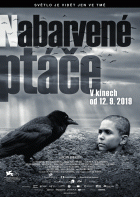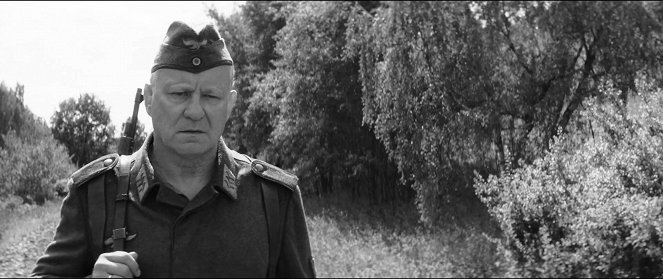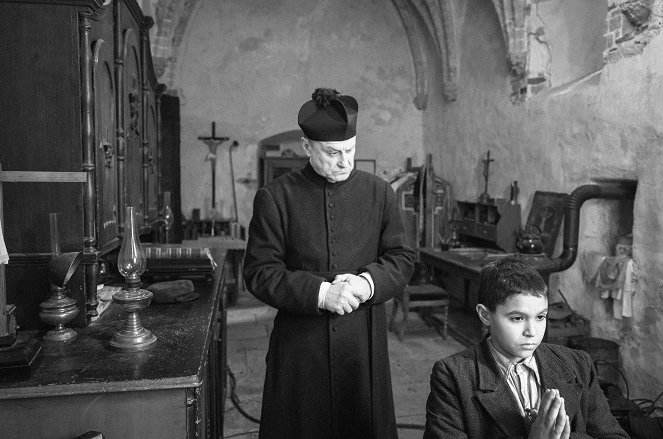Directed by:
Václav MarhoulScreenplay:
Václav MarhoulCinematography:
Vladimír SmutnýCast:
Petr Kotlár, Udo Kier, Michaela Doležalová, Zdeněk Pecha, Lech Dyblik, Jitka Čvančarová, Stellan Skarsgård, Harvey Keitel, Julian Sands (more)VOD (1)
Plots(1)
Trying to protect their child from the mass extermination of Jews, a Jewish couple sends their son to a relative in the countryside somewhere in Eastern Europe. However, the boy's aunt dies unexpectedly and the child is forced to set out on a lone journey through the wild and hostile world governed only by local rules, prejudices and superstitions. When the war ends, his fight for physical survival is replaced by a different kind of a fight. A battle he may not even be aware of, a battle with himself, a battle for his soul, his future... (Bioscop)
(more)Videos (4)
Reviews (11)
I think the controversy over The Painted Bird is largely an inflated bubble, and I think those leaving audiences in Venice were leaving mainly because they were bored and it wasn't the film for them, it's just that when someone asked them the reason, they just didn't want to be embarrassed and made excuses for the unbearable brutality and that was that. I'm not saying the film is a pleasant spectacle, it's certainly not, but it's a great spectacle and Václav Marhoul has a point. So while there are ugly things happening on screen, there's almost never a need to show them directly in an attempt to shock as much as possible; many times the silence before the storm is even more uncomfortable, or the mere sound of something just happening out of frame. Perhaps what I like most about The Painted Bird, though, is that it's entirely a world film, even though it doesn't try to be one. It’s not exhibitionistic, it remains focused on telling the sordid tale of a journey from darkness to light, aided by excellent actors as much as by Vladimír Smutný's breathtaking cinematography and Marhoul's beauteous direction. It's not for everyone, but that's okay.
()
A peasant road-movie, Roma, Volyň, a twisted The Hundred Year-Old Man Who Climbed Out of the Window and Disappeared or Forrest Gump? The Painted Bird has a little of each, but what it certainly isn't is a historical account, let alone a drama. It’s rather a collection of realistically possible events that are unrealistically glued into one story. It wouldn't be a problem if the situations Jožek gets into were varied and each of them would develop his character differently and move the plot somewhere. But, after a successful introduction, we are left with a repetitive parade of unfortunate episodes with elusive creatures, where the variations, as well as the emotions, are few, because with each subsequent cruel episode you paradoxically worry less about the hero. Kosinski's work is simply unrewarding to film, only a genius with a clear vision could squeeze something more coherent out of it. Marhoul merely retells it and the only genius on the set remains Smutný with his camera.
()
The Painted Bird is undoubtedly an ambitious filmmaking project eyeing festival awards, as evidenced by its strong theme and international cast. I welcomed the black-and-white visuals, which (as was once the case with Psycho) reduced the violence and atrocities presented by the absence of colour. I was intrigued by the episodic nature of the film, in which the young and initially innocent child protagonist meets various characters on his 'journey home' who influence, mark or corrupt him in different ways. By Czech standards, this is without question a supremely raw film featuring pervasive violence against humans and animals and an inhospitable landscape full of suffering, hopelessness and sadness. Of the individual episodes, the ones that stick out in my mind the most are those with the shameless Jitka Čvančarová, the transport of the Jews and the raid on the village. Although the film is nearly three hours long, it went by really fast in the cinema. As noted, the film lacks music alongside the colours - unless you counts the church scenes and the subtitles – which is a bit of a shame, as there is little dialogue and the music could have filled in and enhanced these quiet spots.
()
The biggest problem is that the whole movie is cold as a dog's snout. The much-proclaimed (swooning festival-goers, women running out of the theater) and mentioned explicitnesses are only rarely impressive in their own right – for me the highlight was ironically the sumptuous camera shot at the beginning of the film, when the main character is launching a boat down the river and the camera takes the whole scene nicely from the surface of the river upward in a kind of "aerial arc". The problem might also be (for me) that I was expecting a completely different film. After the reviews from Venice I was expecting agony, but honestly only one single scene stuck with me a bit, the one from the barn (I won't spoil it, it takes place in the second half of the film and one of those involved is a crazy woman), otherwise everything kind of happened and I kept saying to myself: "Okay, we've ticked off non-consensual sex, next we'll have murder, then abuse, and what's next, Václav?" The film suffers terribly from its format, where it wants to be poetic on one hand (and in which it succeeds to some extent, thanks to the black and white imagery and some really nicely shot scenery) and at the same time convey a powerful and intimate message. "Storytelling through images" is an art in itself, but Marhoul has simply not yet grown there compared to the world's best. I've read in reviews that the biggest difference from the book is the lack of the main character's inner monologues. I dare say (and I haven't read the book) that if Marhoul had retained these at least in part, all of The Painted Bird could have had a much stronger emotional charge. In this film adaptation, there are "just" unpleasant things happening, with a young and "different" boy running around in between it all as he really just tries to survive and get back home (whatever that means). And the psychological evolution of the boy into his tougher self is so terribly cheaply rendered that it felt like downright shoddy work from Marhoul. The film has no proper psychological or emotional depth. There is, of course, a strong social motif, where the black and white shots of the demonic faces of the lifeless villagers are quite chilling. But the whole of The Painted Bird still suffers from a spasmodic episodicity that hopelessly undermines any more powerful lasting impression. Too bad; I'd like to give it more, but I just can't. Still, I must say that I doff my cap to Marhoul, because once again he has put us in a wider awareness than just from Aš to Krnov. The most emotional part of the whole film is that Slavic song in the closing credits.
()
After Tobruk, Václav Marhoul convinced me for the second time that he and I are simply not on the same wavelength. Now, after the almost three-hour ‘frantic ride,’ I can’t help but wonder what he wanted to convey with this film. Next to Come and See and Hatred, The Painted Bird feels rather underwhelming. The information that the story takes place during WWII came to me only in the form of a Storch flying over, other indications appeared much later. I still don't know where the story was set (Carpathian Ruthenia?). I also didn't understand why the little Jew was played by a Gipsy. The story unfolded in a very awkward way. Throughout the film I felt like it was weirdly cut, I was annoyed by its strange rhythm: boring, boring, boring - brutal violence - boring, boring, boring - brutal violence - boring, boring, boring – pedophilia - boring, boring, boring - zoophilia, etc. I also didn't understand why there was violence in the film in the first place when the creators were obviously more afraid of it than the viewers. That way, most scenes look silly bordering on ridiculous. For example, the completely pointless zoophilia scene had me in stitches, Václav Marhoul can't have been serious. On the other hand, if Fifty Shades of Grey gives you goosebumps, this will be a rough experience for you, which might even lead to some involuntary bedwetting. At least I already know what those awards were for. Wait... actually, I don't. P.S. Those bikini tan lines on Denisa Pfauserová sure looked historically accurate :-)
()



Ads